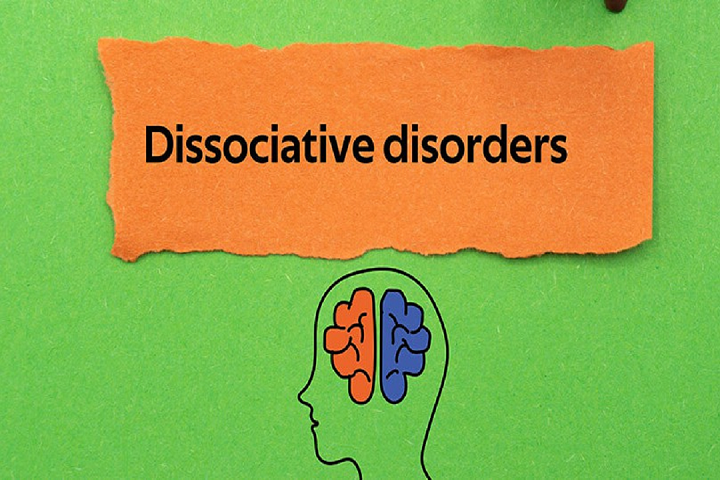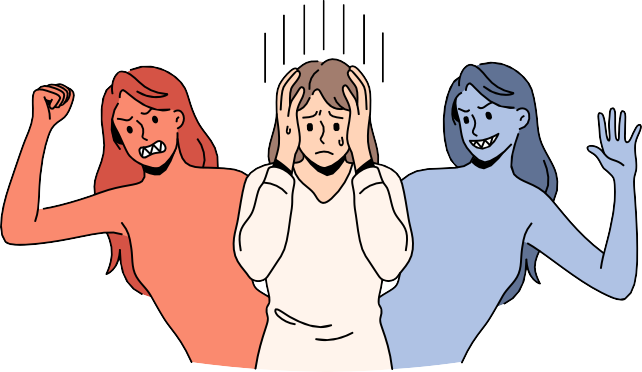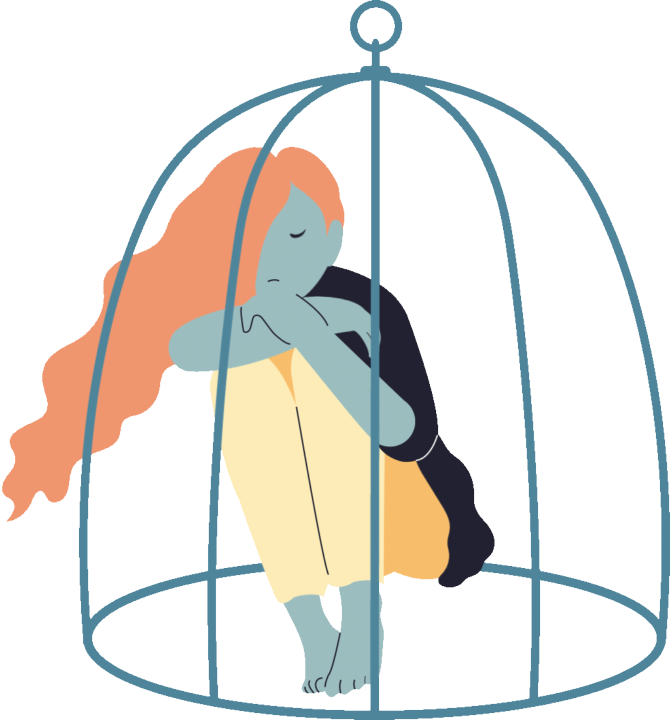- Home
- Dissociative Disorder
Dissociative Disorder
Psynchronize Minds’ Dissociative Disorder Clinic under the Guidance of Dr. Nirzaree Parikh
Understanding Dissociative Disorders:
Dissociative disorders involve an involuntary escape from reality characterized by a disconnection between thoughts, identity, consciousness, and memory. People from all age groups and racial, ethnic, and socioeconomic backgrounds can experience these disorders.

Types of Dissociative Disorders According to ICD-10:
- Dissociative Convulsions (ICD-10: F44.5)
Deflnition: These are convulsions that resemble epileptic seizures but lack a neurological basis. They are a type of dissociative disorder where psychological stress is converted into physical symptoms.
Symptoms:
- Seizure-like episodes without loss of consciousness.
- No neurological abnormalities on EEG or other tests.
- Episodes often triggered by emotional stress or trauma.
- Movements can be more varied and less stereotyped than those seen in epilepsy.
Diagnosis:
- Exclusion of epileptic seizures through neurological testing.
- Psychological evaluation to identify underlying stressors or trauma.
Treatment:
- Psychotherapy, particularly cognitive-behavioral therapy (CBT).
- Stress management and counseling.
- Sometimes, medication for co-occurring conditions like anxiety or depression
Dissociative Motor Disorder (ICD-10: F44.4)
Deflnition: Characterized by a loss or alteration in voluntary motor function, which cannot be explained by medical or neurological conditions.
Symptoms:
- Paralysis, muscle weakness, or abnormal movements (e.g., tremors, dystonia).
- Symptoms often follow a stressful event or psychological conflict.
- Inconsistencies in the physical examination (e.g., Hoover’s sign).
Diagnosis:
- Detailed clinical evaluation to rule out neurological disorders.
- Consideration of the temporal relationship between symptoms and psychological stress.
Treatment:
- Psychotherapy, especially CBT and psychodynamic therapy.
- Physical rehabilitation to restore motor function.
- Addressing any underlying psychological issues such as trauma or stress.
Dissociative Sensory Disorder (ICD-10: F44.6)
Deflnition: Involves a loss or alteration in sensory function that cannot be attributed to a medical condition.
Symptoms:
- Anesthesia or hypersensitivity in various parts of the body.
- Loss of sensory modalities like vision, hearing, or touch.
- Symptoms are typically inconsistent with known neurological pathways. Often associated with a psychological conflict or stressor.
Diagnosis:
- Comprehensive assessment to exclude neurological and medical causes.
- Psychological evaluation to explore potential stressors or trauma.
Treatment:
- Psychotherapy, particularly CBT and trauma-focused therapy.
- Sensory retraining and rehabilitation.
- Stress management techniques and supportive counseling.
These dissociative disorders are understood as physical manifestations of psychological distress, and effective treatment often involves addressing both the psychological and physical aspects of the condition.
Dissociative Amnesia: Inability to recall important personal information, usually of a traumatic or stressful nature, that is too extensive to be explained by ordinary forgetfulness.
Dissociative Fugue: Sudden, unexpected travel away from home or one’s customary place of work, with an inability to recall one’s past, confusion about personal identity, or the assumption of a new identity.

- Dissociative Identity Disorder (DID): Presence of two or more distinct identities or personality states that recurrently take control of the individual’s behavior, accompanied by an inability to recall personal information beyond what is expected through normal forgetfulness.
- Depersonalization/Derealization Disorder: Persistent or recurrent feelings of detachment from one’s self (depersonalization) or the external world (derealization), as if one is an outside observer of their thoughts, feelings, body, or parts of their life.

- Mixed Dissociative Disorder, is complex mental health condition, encompasses a range of symptoms that involve disruptions in memory, identity, emotion, perception, and behavior. Here’s a concise breakdown of its key aspects:
- Nature of the Disorder: It is a type of Dissociative Disorder not specified elsewhere in major diagnostic manuals, combining features of several dissociative disorders. It includes symptoms such as amnesia, identity confusion, and depersonalization/derealization, without fitting neatly into a single diagnostic category.

Symptoms and Manifestations:
- Amnesia: Inability to recall important personal information, typically of a traumatic or stressful nature, that cannot be explained by ordinary forgetfulness.
- Identity Confusion or Alteration: Persistent uncertainty or confusion about one’s identity, or the presence of two or more distinct identities or personality states that recurrently take control of the individual’s behavior.
- Depersonalization/Derealization: Experiences of feeling detached from one’s own thoughts, feelings, body (depersonalization), or sensing that one’s surroundings are unreal (derealization).
Causes and Risk Factors:
- Trauma is a principal cause, with many individuals having histories of severe physical, emotional, or sexual abuse during childhood.
- Stressful or life-threatening events can also trigger dissociative symptoms.
- There is evidence suggesting a biological predisposition to dissociative disorders, possibly involving brain function abnormalities.
Diagnosis:
Diagnosis involves a comprehensive assessment, including a detailed psychiatric interview, a review of symptoms, and sometimes psychological testing.

Medical Treatment and Psychological Services:
Therapy: Cognitive-behavioral therapy, dialectical behavior therapy, and Eye Movement Desensitization and Reprocessing (EMDR).
Medication: No specific medication for dissociative disorders, but treatment may include medications for depression, anxiety, or other co-occurring conditions.

Diagnosing dissociative convulsions involves ruling out epilepsy and other neurological conditions, which can be a lengthy and complex process.
Treatment typically focuses on addressing the underlying psychological issues through therapy, such as cognitive behavioral therapy (CBT), and sometimes medication to manage symptoms. It’s a condition that underscores the intricate relationship between the mind and body, highlighting the impact of psychological factors on physical health. As awareness and understanding of dissociative convulsions grow, so does the hope for effective management and support for those affected.
Symptoms and Characteristics:
- Memory loss of specific times, people, and events
- Out-of-body experiences, such as feeling detached from oneself
- Mental health problems, such as depression, anxiety, and suicidal thoughts and behaviors
- A sense of being detached from emotions
- Identity confusion or having multiple identities
Psychometric Assessments Available:
- Dissociative Experiences Scale (DES)
- Structured Clinical Interview for DSM-5 Dissociative Disorders (SCID-D)
Challenges Faced by Individuals:
- Social Isolation: Dimculty in maintaining relationships due to fluctuations in identity or memory gaps.
- Workplace Issues: Inconsistencies in performance and attendance due to episodes of dissociation.
- Mental Health Struggles: Increased risk of substance abuse, depression, anxiety, and suicidal thoughts.

Why Choose Dr. Nirzaree Parikh for Treatment:
With extensive experience in the field of mental health, Dr. Parikh offers a compassionate, patient-centered approach. Utilizing the latest research and techniques, Dr. Parikh and the Psynchronize Minds team are equipped to provide comprehensive care tailored to each individual’s needs.
At Psynchronize Minds, we understand the complexity of dissociative disorders and are dedicated to providing a path toward healing and integration. Our
commitment to excellence in care and the unique expertise of Dr. Nirzaree Parikh makes us a leading choice for those seeking support in managing dissociative disorders.
